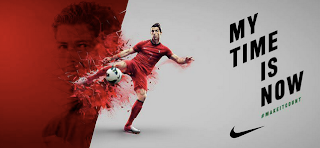The England team for Euro 2012 has been told to be wary when using
Twitter. The Spanish and Danish teams have been banned from its use during the tournament. Clearly, some football establishments fear the potential
repercussions of 'wayward' Tweeting. 'Players need to be told what they can and can't say. As long as there's emotion and somebody can make a statement
at the end of a mobile phone, there will always be social media cock-ups', says
Peter Wood, social media account manager at Steak, a digital marketing
agency.
Yet, however important it may be to avoid a Barton-esque Twitter row
during a major international tournament, the argument against limiting the use
of social media is simply put: the Danish goalkeeper Tomas Sorenson, described it as a
'shame' to be unable to speak with fans, and the Danish Sports Minister, Uffe
Elbaek,declared it 'a violation of freedom of speech.'
A curb on freedom of speech it may be, but football managers have made
their feelings plain on the matter. Just
ask Neil Warnock, who blamed Twitter for losing his job at QPR. Ask Alan Pardew, who said that, 'putting something out
instantly can be very, very, damaging - not only to a football club but to any organisation.' 'Sir Alex shared with me quite ferociously how
difficult this Twitter issue is for clubs, particularly managers.'Last August, Pardew issued legal warnings to Newcastle United players
that criticising the club was a breach of contract.
Perhaps the FA is particularly worried about what might emanate from
certain England players at the upcoming tournament. Wayne Rooney is suspended from England's first two matches at Euro 2012
and will have time on his hands. He has not been afraid in the past to express
disenchantment.
He notoriously criticised England fans after the dire game against
Algeria during World Cup 2010 in South Africa, and caused astonishment last
year when he offered to fight a 'fan' who had insulted him on Twitter. The FA
might well be glad that Rio Ferdinand is not part of the squad going to Poland
and Ukraine, since he has had his fair share of Twitter
controversy. In April last year he famously exchanged insults with Piers
Morgan for four hours on Twitter.
The advent of Twitter and its real-time communication between players
and everyone else has rejuvenated and accelerated an age-old issue. If you
limit or block someone's communications
then you are infringing their right to freedom of speech. If you allow
unlimited freedom of speech then you will inevitably get abuses of that right.
Which is more important for England's representatives at Euro 2012? An
unadulterated though silent focus on the tournament? Or their right to speak out
when and how they wish?
Understandably the FA is inclined to support the former and take no
risks. They hope that wariness of Twitter will slow potential exposure of
off-pitch controversy and reduce the potential for distraction.
Steven Gerrard told a news conference on Friday that, 'We've been told
not to be Tweeting anything unnecessary.' Maybe England's players will be
spending more time than they should,
wondering whether or not one of their Tweets be unnecessary.













